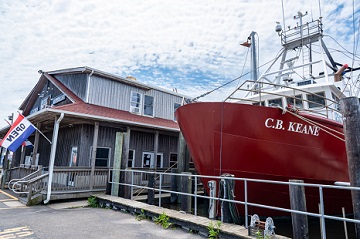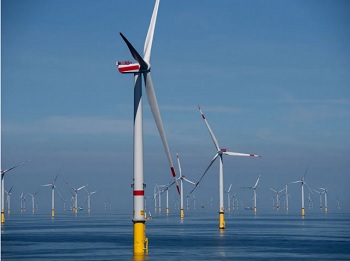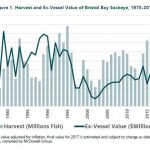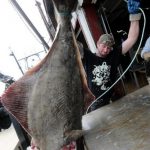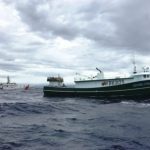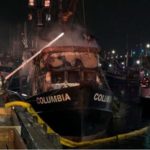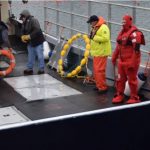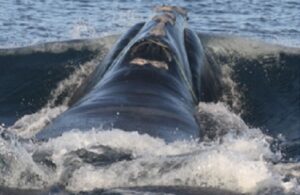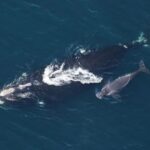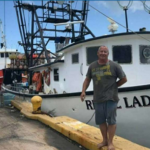I am tired of being misled by big corporations, lectured by elites on what we must be willing to accept, and sold out by our own government, which is all too willing to ship our hard-earned money overseas. I remain deeply concerned that these offshore wind projects are the latest, and perhaps most egregious, example of this sad reality. The recent whale deaths have served as a wakeup call, bringing renewed and necessary attention to potentially the greatest threat our regional economy has faced since we defeated North Jersey casinos. In years past, if several dead whales washed ashore on Atlantic and Cape May County beaches over the course of a few weeks, it would have set off environmental alarm bells. Yet, for some reason, we are told by environmental groups that everything is “fine” and that additional investigations relating to their cause of death are completely unnecessary. >click to read< 12:50
Tag Archives: dead whales
THANK YOU, THANK YOU, THANK YOU, PRESIDENT TRUMP – By Jim Lovgren
 President Trump proved he is a man of his word on April 16, when he announced a temporary hold on the Empire wind project off of New York, along with all other projects, pending a comprehensive review of the Biden administrations shenanigans in the permitting process. The Executive Order, called, “Restoring American seafood competitiveness” would initiate a 180-day review of ocean National monuments, while temporarily stopping the Empire wind project. The wide ranging EO also plans to reduce the regulatory burden on fishermen, address foreign trade imbalances, improve fishery management, and more. The most important point that has come out of this offshore wind issue is that Citizens can fight against the machine, and win. While a number of fishing groups had been fighting for years against the planned destruction of their fishing grounds by offshore wind companies, it wasn’t until the general public became enraged more, >>CLICK TO READ<< 15:40
President Trump proved he is a man of his word on April 16, when he announced a temporary hold on the Empire wind project off of New York, along with all other projects, pending a comprehensive review of the Biden administrations shenanigans in the permitting process. The Executive Order, called, “Restoring American seafood competitiveness” would initiate a 180-day review of ocean National monuments, while temporarily stopping the Empire wind project. The wide ranging EO also plans to reduce the regulatory burden on fishermen, address foreign trade imbalances, improve fishery management, and more. The most important point that has come out of this offshore wind issue is that Citizens can fight against the machine, and win. While a number of fishing groups had been fighting for years against the planned destruction of their fishing grounds by offshore wind companies, it wasn’t until the general public became enraged more, >>CLICK TO READ<< 15:40
Maine’s massive “floating wind” folly — my report
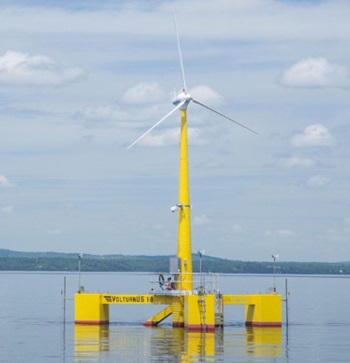 Below is my Executive Summary, followed by the latest bad news on this ongoing silly saga. This report examines several fundamental aspects of the State of Maine’s offshore wind development plan. It is divided into two parts. Part 1 examines certain economic issues, such as feasibility, cost, and progress to date. Part 2 explores the proposed development as it relates to the entire Gulf of Maine, namely because the project has not advanced to the point where the State of Maine’s responsibilities have been defined. The offshore wind plan calls for development of 3,000 MW of generating capacity, an amount that is roughly double Maine’s average electricity usage. The viability of Maine’s offshore wind plan depends entirely on the massive transformation of the state’s grid from fossil fuel use to electrification. It is clear that the citizens of Maine have not been informed of this vast transformation requirement. They have certainly not approved it. more, >>CLICK TO READ<< 09:34
Below is my Executive Summary, followed by the latest bad news on this ongoing silly saga. This report examines several fundamental aspects of the State of Maine’s offshore wind development plan. It is divided into two parts. Part 1 examines certain economic issues, such as feasibility, cost, and progress to date. Part 2 explores the proposed development as it relates to the entire Gulf of Maine, namely because the project has not advanced to the point where the State of Maine’s responsibilities have been defined. The offshore wind plan calls for development of 3,000 MW of generating capacity, an amount that is roughly double Maine’s average electricity usage. The viability of Maine’s offshore wind plan depends entirely on the massive transformation of the state’s grid from fossil fuel use to electrification. It is clear that the citizens of Maine have not been informed of this vast transformation requirement. They have certainly not approved it. more, >>CLICK TO READ<< 09:34
Professor Makes Stunning Discovery: ‘Absolutely, 100 percent, Offshore Wind Kills Whales’
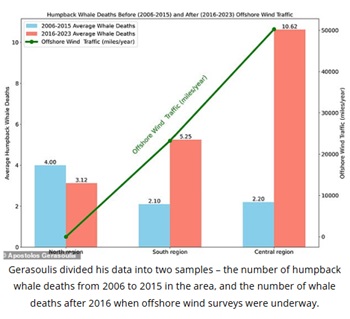 For the best part of half a century, a 41-foot humpback whale named Luna swam up and down the East Coast. Then on Jan. 30, 2023, Luna washed up dead on Long Island, New York. He was the tenth whale to strand on beaches in New York and New Jersey in nine weeks. Environmentalists, politicians, and ordinary citizens loudly wondered if the construction of offshore wind turbines was killing them. Apostolos Gerasoulis, a Rutgers professor emeritus of computer science who co-created the search engine that powers Ask.com, now says the answer is yes. ‘Absolutely, 100 percent, offshore wind kills whales,’ he says. But the National Oceanic and Atmospheric Administration (NOAA), which is responsible for protecting marine animals and their habitats insists there is no connection. Charts, graphs, more, >>CLICK TO READ<< 11:48
For the best part of half a century, a 41-foot humpback whale named Luna swam up and down the East Coast. Then on Jan. 30, 2023, Luna washed up dead on Long Island, New York. He was the tenth whale to strand on beaches in New York and New Jersey in nine weeks. Environmentalists, politicians, and ordinary citizens loudly wondered if the construction of offshore wind turbines was killing them. Apostolos Gerasoulis, a Rutgers professor emeritus of computer science who co-created the search engine that powers Ask.com, now says the answer is yes. ‘Absolutely, 100 percent, offshore wind kills whales,’ he says. But the National Oceanic and Atmospheric Administration (NOAA), which is responsible for protecting marine animals and their habitats insists there is no connection. Charts, graphs, more, >>CLICK TO READ<< 11:48

Trump Vows ‘Day One’ Executive Order Targeting Offshore Wind
Donald Trump vowed to issue an executive order targeting offshore wind development if he wins a second term as president, making his most explicit threat yet toward the growing industry. The presumptive Republican nominee derided offshore wind projects as lethal for birds and whales during his oceanfront rally Saturday in Wildwood, New Jersey, and committed to take action. “We are going to make sure that that ends on day one,” he said. “I’m going to write it out in an executive order.” While Trump has made no secret of his animus to wind power, he had adopted a mostly hands-off posture during his first term in the White House. The remarks in New Jersey suggest he may take a more aggressive stance if given a second. more, >>CLICK TO READ<< 13:03
Offshore Wind Lease Areas Impede on Historic Fishing Grounds
 In announcing its decision Monday (the initial deadline for comment), BOEM said it received requests from tribal nations and stakeholders to provide more time to review and comment on the lengthy environmental document. The decision also came on the 40th anniversary of COA’s incorporation. “When we started in 1984, the ocean was the dumping capital of the world. We worked really hard to clean it up and in 2000 we ended ocean dumping. (That’s) the power of the people,” Cindy Zipf, COA executive director, said. Since then, the Atlantic Ocean has thrived, she added. “We’ve seen majestic animals and (the) bounty of what she (the ocean) provides (us) free,” Zipf said. “What’s the return now? There’s a bunch of people that want to industrialize the ocean to claim some green energy revolution, but the facts aren’t there. We don’t see them.” more, by Gina G. Scala, >>click to read<< 10:41
In announcing its decision Monday (the initial deadline for comment), BOEM said it received requests from tribal nations and stakeholders to provide more time to review and comment on the lengthy environmental document. The decision also came on the 40th anniversary of COA’s incorporation. “When we started in 1984, the ocean was the dumping capital of the world. We worked really hard to clean it up and in 2000 we ended ocean dumping. (That’s) the power of the people,” Cindy Zipf, COA executive director, said. Since then, the Atlantic Ocean has thrived, she added. “We’ve seen majestic animals and (the) bounty of what she (the ocean) provides (us) free,” Zipf said. “What’s the return now? There’s a bunch of people that want to industrialize the ocean to claim some green energy revolution, but the facts aren’t there. We don’t see them.” more, by Gina G. Scala, >>click to read<< 10:41
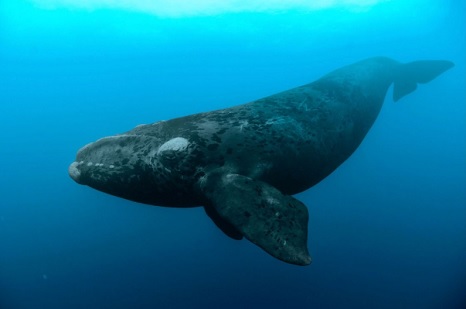
Biden Administration Is Killing Whales and Covering it Up
The Biden Administration is rushing headlong to start the massive construction of offshore wind power projects off the East Coast. The wind industry calls these installations “farms.” In no way, shape, or form do they resemble bucolic farms. Fortunately, several citizen groups have been formed which are vigorously opposing this massive industrialization of the ocean. The two leading organizations are Save Right Whales Coalition, lead by Lisa Linowes, and Save Long Beach Island, lead by Dr. Robert Stern. In addition, Michael Shellenberger has produced a terrific documentary, Thrown to the Wind, which provides an eye-opening view into the real world of noise produced by so called survey ships. Save LBI has also initiated litigation in New Jersey federal court seeking to revoke the permits issued by the Bureau of Ocean Energy Management (BOEM) authorizing this pre-construction activity. By Collister Johnson. >>click to read<< 09:26
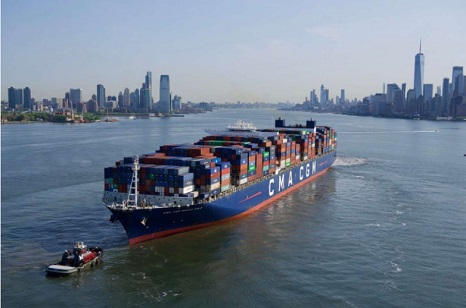
Why are the whales dying? Sea mammal deaths hit record in New York and New Jersey
As whales wash up along East Coast shores at alarming rates, researchers dissect decomposing carcasses, logging whether ship strikes or fishing gear factored into each demise, while some beachgoers wonder if their favorite coastline will be next. At least 14 humpbacks and minke whales have been found dead thus far in 2023 in waters off New York and New Jersey — up from 9 in the entirety of last year. The most recent deaths were two humpbacks, whose corpses were spotted May 31, in Raritan Bay off Keansburg, New Jersey, and Wainscott on Long Island. >click to read< 11:52
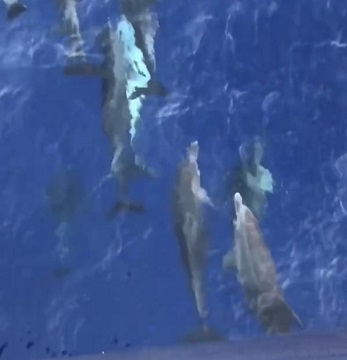
A seismic blasting whistleblower speaks
Hayley had been working on seismic blasting vessels for almost three years when she realised just how destructive the practice was. Her final assessment was simple: “I can’t believe that this is legal.” Hayley, who asked for her real name to not be used, was employed as a marine fauna observer. Her job was to look for marine mammals such as the southern right whale, which could be harmed by the blasts used to search the ocean floor for oil and gas. Blasting would be paused only when specific whales were sighted. The negative impacts of the blasting are hard to see because they happen below the surface. >click to read< 10:16
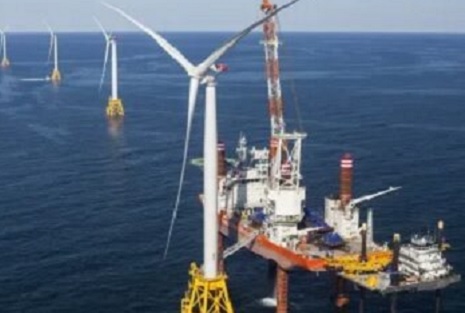
Where have all the dead whales gone? By Nils Stolpe, FishNet-USA
Beginning in December of last year and extending through most of the first quarter of 2023, New Jersey and New York beaches were inundated with abnormally high numbers of dead or dying whales and smaller marine mammals. These majestic creatures-though not so majestic when being pushed about willy-nilly by tides, wind, waves and various types of earth moving machines-have never expired in such large numbers in such publicly accessible locations in local residents’ memories. Perhaps coincidently, intensive hydroacoustic surveys to determine the suitability of potential sites for the construction of thousands of gigantic windmills and their supporting infrastructure (supposedly to help us all survive what is being sold as an imminent energy/climate crisis) were being committed offshore of the beaches where all of these marine mammal deaths and strandings have been concentrated. To us inveterate observers of that hunk of Atlantic Ocean real estate known as the New York Bight, and the critters that temporarily or permanently live there, and of the actions of the public agencies charged with-and entitled to tens of millions of taxpayer dollars each year to do so-administering the Endangered Species and the Marine Mammal Protection Acts, that surely hints at, at best, ineptitude at that’s ineptitude at a fairly advanced level. >click to read the article< 16:14

Few benefits seen from close-to-shore wind turbines
It’s beyond offensive for Gov. Phil Murphy to dismiss as “disinformation” the concerns of many of his constituents about a possible connection between wind energy survey work and the almost weekly occurrence of dead whales floating onto the Jersey Shore. Here are some things the governor has repeatedly failed to address: The planned wind farms, particularly those off of Long Beach Island, will have structures up to 1,000 feet tall, and will be close enough to land to be visible from beaches. For the Atlantic Shore project, they will be as few as 9 miles offshore. These hundreds of turbines proposed for three installations could bring devastating results to the state’s commercial fishing and tourism industries. >click to read< 09:19
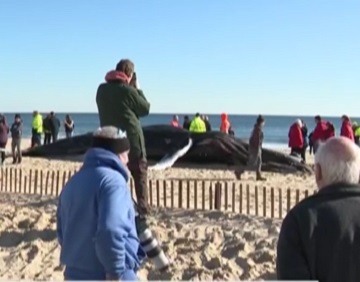
Save The Whales rally planned at Point Pleasant Beach after 9th whale found dead
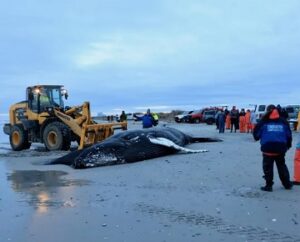
2 whales found dead along Atlantic Coast were likely hit by boats, NOAA says.
Necropsies on two whales found dead along the Atlantic coast this week revealed that both marine mammals showed evidence of vessel strikes. Both whales, a critically endangered North Atlantic right whale and a humpback, were already beginning to decompose, but preliminary results show internal injuries consistent with the blunt force trauma of a vessel strike, the National Oceanic and Atmospheric Administration said Tuesday. The deaths are among a flurry of 21 whale deaths along the length of the Atlantic coast since Dec. 3. >click to read< 09:20

N.J. Sierra Club sides with wind (and Phil Murphy) over dead whales
On Tuesday, New Jersey’s Sierra Club chapter and the League of Conservation Voters held a presser in Atlantic City to… demand an end to offshore wind farm exploration? Accountability from politically-power wind industry executives? A comprehensive independent study to determine whether turbine projects are killing whales? Nope. The Garden State’s best-known environmental groups teamed up to side with wind (and Phil Murphy) over whales. Meanwhile, Republican State Senator Vince Polistina (R-2), who represents Atlantic City, has called for a suspension of wind turbine activity following the spate of whale deaths. He also attended the Sierra Club/LCV press conference and expressed surprise at the lack of concern expressed for the natural environment by… environmentalists. >click to read< 12:43
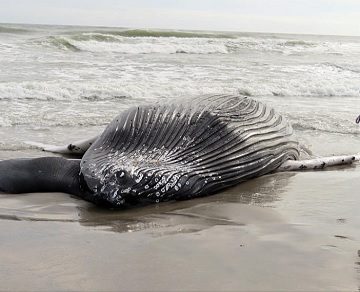
What really killed the whales? Environmental groups in New Jersey are squaring off.
Following the discovery of a 30-foot humpback whale that washed ashore in Atlantic City earlier this month, several groups including Clean Ocean Action wrote to President Biden demanding a pause on all wind-energy activity off the Jersey coast and an investigation into why a total of seven whales have perished in less than five weeks. According to Jennifer Coffey, the executive director of the New Jersey Association of Environmental Commission, suggestions that the Garden State’s plan to construct a huge wind farm out in the ocean have anything to do with the whale tragedies are unfortunate and misguided. >click to read< 08:15

Governor Murphy has a whale of a problem with his offshore energy plan
“Circumambulate the city of a dreamy Sabbath afternoon … Things have changed a lot since 1851, when Herman Melville wrote those words. But the Atlantic Ocean hasn’t. People still wander to its shores to gaze at an ocean devoid of man-made objects. But not for long, not if Phil Murphy gets his way. In his State of the State address, Gov. Phil Murphy boasted of his plan to have hundreds of wind turbines built offshore, some more than 900 feet tall. The governor also mentioned his commitment to “environmental justice.” We are used to looking at the ocean as public, but the Murphy administration wants to award large chunks of it to multinational corporations such as Royal Dutch Shell. We’re seeing that with groups like the Sierra Club and the Audubon Society. >click to read< 11:39
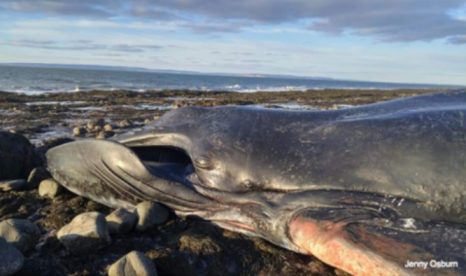
Two dead whales wash up on the coast of Nova Scotia, Canada
It’s too soon to say what’s behind the death of a humpback whale that washed up on Nova Scotia’s Fundy Shore near the community of Ogilvie, N.S. The humpback is one of two large whales found washed up along the Nova Scotia coast this weekend. “It would definitely take a pretty thorough examination to find out what might have killed it,” said Andrew Reid, response co-ordinator for the Marine Animal Response Society (MARS). He said his organization got the call about the carcass on the Bay of Fundy beach late Sunday. >click to read< 15:01
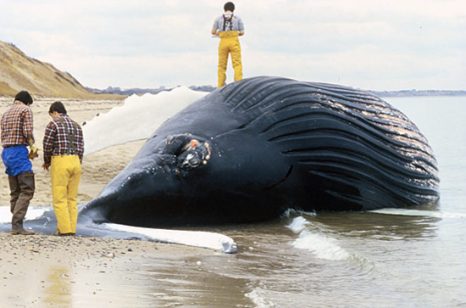
On This Day: Dec. 19, 1987, An “unprecedented mortality” – Tainted Fish Found in Dead Whales on Cape Cod
Contaminated mackerel were found in the stomachs of nine whales that died recently along Cape Cod beaches, a finding that may help explain other mysterious marine fatalities, researchers said today. ”We have what appears to be an unprecedented mortality in marine mammals,” Joseph R. Geraci, a marine pathologist, said at the New England Aquarium here. ”Perhaps not unprecedented in that it occurred, but unprecedented in that we have discovered for the first time a biological toxin that is directly reponsible for the deaths.” click here to read the story 08:49
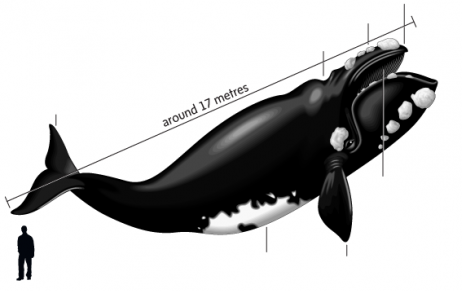
Why are whales dying in the Gulf of St. Lawrence? What it means for fisheries and the future
It was about four years ago when the sightings first began. In the beginning, just a few fishermen reported seeing large black whales in the Gulf of St. Lawrence, in areas clustered off the coast of Cape Breton Island. With each summer came more sightings. One was seen off the north coast of PEI. Another off of Pleasant Bay at Cape Breton Highlands National Park. A couple off of Southside Antigonish Harbour. Soon, the reports were in the dozens. The sightings were initially treated as a passing curiosity. The North Atlantic right whale, a rare and endangered species distinguished by patches of roughened white skin, had been seen off the coast of the Gaspé in Quebec before – though few could recall ever seeing them in this part of the gulf. But then came the deaths. That’s when everyone started paying attention – especially the fishermen. click here to read the story 14:47







